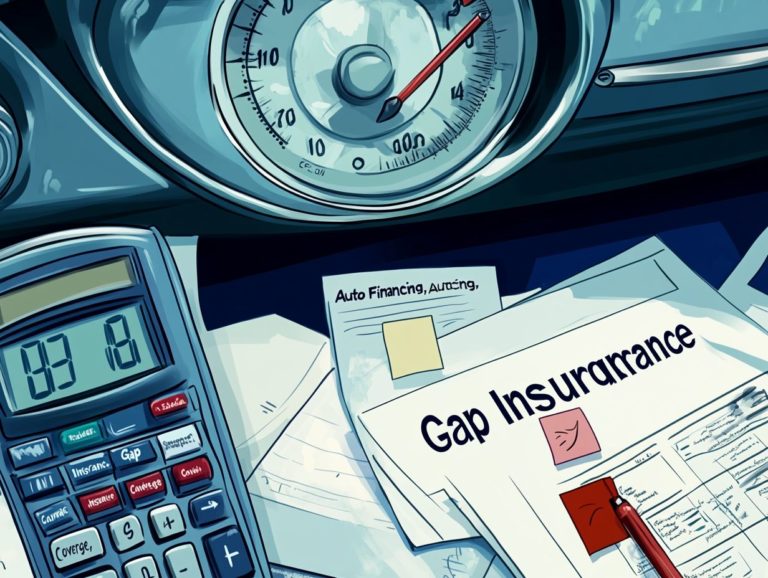Understanding the Role of a Loan Officer
Navigating the world of loans can feel overwhelming, but a skilled loan officer is your trusted guide through this complex landscape.
Let s explore the essential role of a loan officer, detailing their responsibilities, qualifications, and the various types of loans they manage from mortgages to personal and business loans.
Get ready to uncover the critical part a loan officer plays in the lending process, the challenges they encounter, and the rewards that come with the profession.
You will find valuable tips for working effectively with a loan officer, ensuring a smooth borrowing experience. Dive in to gain a clearer understanding and empower yourself to make informed financial decisions.
Contents
- Key Takeaways:
- What is a Loan Officer?
- Qualifications and Skills of a Loan Officer
- Types of Loans Handled by Loan Officers
- The Loan Officer’s Role in the Loan Process
- Challenges and Rewards of Being a Loan Officer
- Tips for Working with a Loan Officer
- Frequently Asked Questions
- What is the role of a Loan Officer?
- What are the main duties of a Loan Officer?
- What skills are necessary for a Loan Officer?
- How do loan officers determine a borrower’s creditworthiness?
- What are the different types of loans a loan officer deals with?
- How can a borrower benefit from understanding the role of a loan officer?
Key Takeaways:

- A loan officer is a financial professional responsible for facilitating the loan process for clients, including evaluating their creditworthiness and recommending the best loan options.
- The qualifications of a loan officer typically include a bachelor’s degree in finance or a related field, experience in the financial industry, and licensing. Additionally, strong communication and analytical skills are essential.
- Loan officers handle various types of loans, such as mortgages, personal loans, and business loans. They must have a comprehensive understanding of each type and its specific requirements.
What is a Loan Officer?
A Loan Officer is a distinguished financial expert dedicated to guiding borrowers through the loan application process at financial institutions.
They identify the most suitable loan products, including secured, unsecured, or mortgage loans. Their role involves carefully assessing creditworthiness and understanding the process.
Along with evaluating options, Loan Officers must master the nuances of documentation and compliance with regulations, all while offering exceptional support to clients throughout their journey. Their expertise not only influences loan eligibility but also significantly enhances the overall borrowing experience for those in search of financial solutions.
Definition and Responsibilities
As a Loan Officer, your primary responsibilities involve guiding clients through the intricacies of the loan application process while providing the necessary consumer assistance to ensure a seamless experience.
Beyond this essential role, you assess clients’ financial needs by carefully reviewing their income, credit history, and existing debts. This thorough evaluation allows you to determine the most suitable loan options available for them.
You also take great care in preparing and reviewing loan documentation, ensuring that every piece of paperwork is complete and accurate to prevent any unnecessary delays.
Moreover, you advise clients on a variety of loan products, clearly explaining interest rates, terms, and repayment options. This gives individuals the power to make informed financial decisions tailored to their circumstances.
Your expertise not only streamlines the application process but also enhances the financial institution’s reputation, fostering trust and satisfaction among borrowers.
Qualifications and Skills of a Loan Officer
To thrive as a successful Loan Officer, you need to cultivate a distinctive blend of qualifications, skills, and experience that are vital for effectively maneuvering through the loan process.
A robust educational background typically in finance or business paired with hands-on experience in a financial institution lays a solid groundwork for grasping a variety of loan products, such as mortgage and personal loans.
Additionally, acquiring the necessary licenses through the Nationwide Multistate Licensing System is essential for building your credibility in the field.
A deep understanding of creditworthiness is equally important, as it enables you to evaluate potential borrowers and guide them toward their loan eligibility with confidence.
Ready to explore your loan options? Connect with a loan officer today!
Education, Experience, and Licensing Requirements
Education and experience are essential for you as a Loan Officer. You need to navigate the complexities of various loan products and the intricacies of the loan application process.
Most aspiring Loan Officers pursue a bachelor s degree in finance. This degree offers a solid foundation in economic principles and lending practices.
Gaining work experience in financial institutions such as banks or credit unions is invaluable. It offers you practical exposure to the industry.
It s crucial for you to understand the licensing requirements outlined by the Nationwide Multistate Licensing System. This ensures that you follow the rules and comply with regulatory standards.
Engaging in ongoing education and specialized training can significantly enhance your skill set. This allows you to remain competitive and effective in the ever-evolving financial landscape.
Types of Loans Handled by Loan Officers

As a Loan Officer, you manage a diverse array of loans think mortgage loans, personal loans, and business loans. Each type is designed to meet the unique financial needs of your clients.
Your expertise gives you the power to navigate a variety of loan products. This ranges from secured loans like home mortgages to unsecured loans, guiding clients toward informed decisions.
It s essential that you grasp the intricacies of each loan type. Whether it s an FHA loan or a VA loan, you can provide accurate information and help borrowers choose the best options for their circumstances.
This role goes beyond processing applications! It s about educating your clients on the benefits and challenges associated with different loan types. You ensure they are well-equipped to make the right choices for their financial futures.
Mortgages, Personal Loans, Business Loans, etc.
Loan Officers are your go-to experts for navigating the diverse landscape of loans. Whether you re looking at mortgages, personal loans, or business loans, each type has its unique features and requirements.
It’s essential for you to grasp the differences between secured and unsecured loans. Secured loans, backed by collateral, often come with the perk of lower interest rates.
Think home equity lines of credit or auto loans, but keep in mind that you ll need to put up valuable assets as security. On the flip side, unsecured loans, like personal loans or credit cards, don t require collateral but usually come with higher interest rates due to the increased risk for lenders.
Loan Officers assess your financial profile. They guide you through the specific eligibility criteria, which range from credit scores to income verification.
They assist you in the application process, ensuring that you make well-informed decisions tailored to your unique financial needs.
The Loan Officer’s Role in the Loan Process
The Loan Officer is central to the entire loan process, expertly guiding you from the initial application all the way to loan closing. This journey involves a series of essential steps, such as gathering the necessary documentation and ensuring that everything complies with the requirements for successful loan approval.
They serve as your primary point of contact between you and the lender. They offer valuable insights into the loan process while clearly explaining the terms and conditions of various loan products.
Their expertise is crucial in helping you navigate any challenges. This ensures you achieve your financial goals with confidence.
Step-by-Step Overview
A step-by-step overview of the loan process reveals the crucial role you, as the Loan Officer, play at every stage.
It all begins with initial inquiries, where you engage potential borrowers. You clarify their needs and objectives.
Following that, applicants submit the necessary forms, which kickstart the formal application process. Next, you assist in gathering essential documentation, such as income statements and credit histories.
You ensure that no detail slips through the cracks. During the stage where lenders evaluate your loan application to determine the risk involved, you maintain effective communication with underwriters.
As the loan progresses toward closing, you offer vital support. This ensures all terms are clear and fully understood, making the entire experience seamless and efficient for everyone involved.
Challenges and Rewards of Being a Loan Officer
Being a Loan Officer comes with unique challenges and rewards that shape your daily experiences as a financial professional.
You ll navigate the complexities of various loan products, manage client expectations, and handle documentation requirements all while ensuring compliance with ever-evolving regulations.
The true reward lies in the satisfaction of helping individuals secure mortgage loans and witnessing the positive transformations your efforts create in their lives.
This blend of challenges and benefits cultivates a dynamic environment that requires adaptability and a commitment to delivering exceptional client service.
Common Challenges and Benefits of the Job

As a Loan Officer, you may face several common challenges, particularly in navigating the myriad loan products and managing client expectations. The pressure to meet aggressive sales targets can create a high-stress environment.
This drive for performance can overshadow the complexities of loan options, making it difficult to educate clients on the best choices for their financial circumstances.
Recognizing this role’s rewards is essential. Assisting individuals and families in achieving their dreams of homeownership brings immense personal satisfaction and the potential for substantial financial rewards through commissions and bonuses.
Striking a balance between these elements is crucial for a successful career in this dynamic field.
Tips for Working with a Loan Officer
To collaborate effectively with a Loan Officer, prepare thoroughly and maintain open lines of communication throughout the loan application process.
Prepare your documents ahead of time, familiarize yourself with your credit score, and be transparent about your financial situation to enhance efficiency.
Clear communication will greatly influence your loan eligibility and empower the Loan Officer to offer personalized assistance.
This approach ensures you remain well-informed about your options and the steps required to secure a mortgage or other types of loans.
How to Prepare and Communicate Effectively
Preparing and communicating effectively with a Loan Officer can elevate your loan application experience.
To ensure seamless interaction, create a checklist that outlines all necessary documentation:
- Pay stubs
- Tax returns
- Identification
Establishing clear financial goals before your meeting helps guide the conversation and keeps both you and the Loan Officer focused on what truly matters.
Never underestimate the power of asking questions. When uncertainties arise, seeking clarification leads to better understanding and strengthens your relationship with the Loan Officer.
This proactive approach ultimately paves the way for well-considered choices throughout the loan process.
Frequently Asked Questions
What is the role of a Loan Officer?
A Loan Officer is a financial professional who helps individuals and businesses obtain loans from financial institutions. Their main responsibility is to assess a borrower’s credit history and determine the best loan options for their specific needs.
What are the main duties of a Loan Officer?

The main duties of a Loan Officer include meeting with potential borrowers to discuss their financial needs, evaluating loan applications, verifying financial information, and recommending loan options. They also help borrowers understand the terms and conditions of their loans.
What skills are necessary for a Loan Officer?
A Loan Officer must have excellent communication and customer service skills, along with strong analytical and problem-solving abilities. They should have a thorough understanding of financial and lending principles, attention to detail, and the ability to work well under pressure.
How do loan officers determine a borrower’s creditworthiness?
Loan officers check several factors to assess creditworthiness. These include the credit score, the debt-to-income ratio (which measures how much debt someone has compared to their income), employment history, and assets and liabilities.
The type of loan and its purpose also play a crucial role in this evaluation.
What are the different types of loans a loan officer deals with?
Loan officers handle various loans, such as mortgages, personal loans, business loans, and student loans. Some may focus on specific loan types, like FHA or VA loans, based on their expertise and employer.
How can a borrower benefit from understanding the role of a loan officer?
Knowing how loan officers work helps borrowers make smart choices about their loans. By grasping the process and criteria used, borrowers can prepare better and improve their chances of loan approval with good terms.






